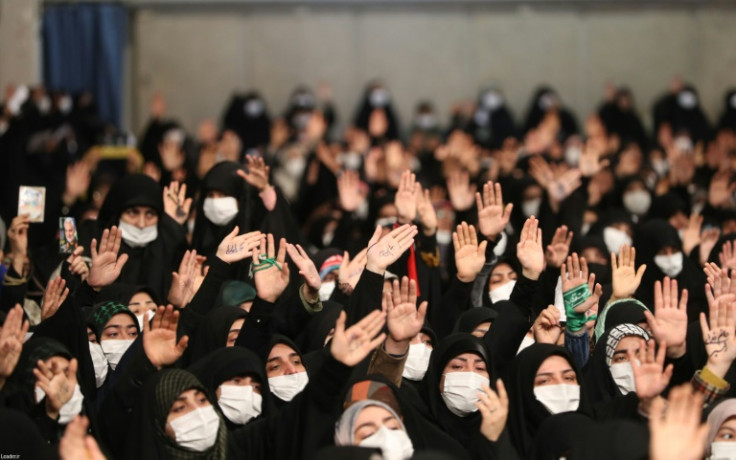Iran Sentences Three More To Death Over Amini Protests

Iran has sentenced to death three more people accused of killing members of the security forces during protests triggered by Mahsa Amini's death, the judiciary said Monday.
The Islamic republic has been rocked by civil unrest since the September 16 death in custody of Kurdish Iranian Amini, 22, following her arrest for allegedly violating Iran's strict dress code for women.
The latest sentences, which can still be appealed, bring to 17 the total number of people condemned to death in connection with nearly four months of protests.
Four executions have been carried out and six of those sentenced to capital punishment have been granted retrials.
Saleh Mirhashemi, Majid Kazemi and Saeed Yaghoubi were sentenced to death on charges of "moharebeh" -- or waging "war against God" -- under Iran's Islamic sharia law, the judiciary's Mizan Online news website reported.
In addition, they were all found guilty of belonging to a "criminal group with the intention of disrupting the security of the country", a charge that carries a 10-year jail term.
Two others were handed prison terms for the incident that led to the deaths of the three security force members in the central province of Isfahan on November 16, Mizan said.
One of them is professional footballer Amir Nasr-Azadani, 26, who received sentences totalling 26 years in prison on three different charges including assisting in "moharebeh".
According to Iranian law, however, he should serve them concurrently, meaning he would be behind bars for 16 years, it said.
Nasr-Azadani's case and the risk of him being sentenced to death had raised alarm abroad, mainly by FIFPRO, the world union of professional footballers.
All the sentences announced can be appealed before the country's supreme court, Mizan said.
Iranian authorities say hundreds of people, including members of the security forces, have been killed and thousands arrested during the protests which they mostly describe as "riots".
Tehran accuses hostile foreign countries and opposition groups of stoking the unrest.
"The goal of people present in the riots was not to overcome the country's weaknesses but to destroy its strengths", Iran's supreme leader Ayatollah Ali Khamenei told an audience in Tehran on Monday, according to his official website.
Khamenei blamed "economic and liveihood problems" for the unrest but said "burning trash cans and rioting in the streets" were not acceptable responses.
"Undoubtedly, these actions are treason, and the responsible institutions deal with treason seriously and justly," he added.
On Saturday, Iran executed Mohammad Mehdi Karami and Seyed Mohammad Hosseini for killing a paramilitary force member in November, in Karaj west of Tehran.
Two other men, Mohsen Shekari and Majidreza Rahnavard, were put to death in December after being convicted of separate attacks on security forces.
The executions have sparked global outrage and new Western sanctions against Tehran.
On Monday, Pope Francis appealed for an end to the death penalty around the world, including Iran.
"The death penalty cannot be employed for a purported state justice, since it does not constitute a deterrent nor render justice to victims, but only fuels the thirst for vengeance," he said.
According to London-based rights group Amnesty International, Iran is second only to China in its use of the death penalty, with at least 314 people executed in 2021.
© Copyright AFP 2025. All rights reserved.





















